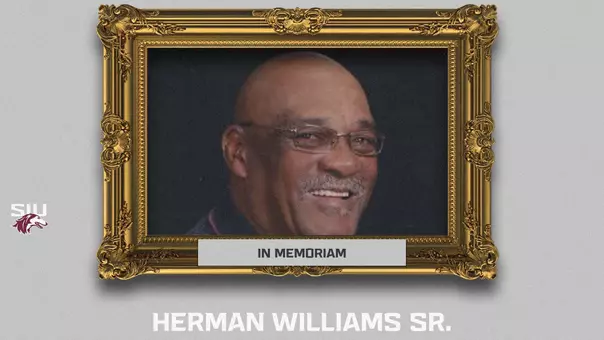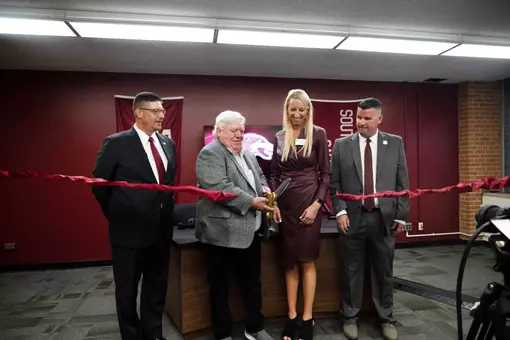NCAA names room after Charlotte West
06/20/2012 | 12:00:00 | General
June 20, 2012
By Josh Weinfuss
NCAA.org
INDIANAPOLIS, Ind. - The NCAA has formally dedicated the new building at its national office in Indianapolis as the Brand Building in honor of the late President Myles Brand.
One of the rooms was named after retired Southern Illinois University athletic director Charlotte West, a pioneer for Title IX.
West has done it all.
She's coached a national title team. She's officiated some of the country's top athletes. She's organized championships. And she's helped guide an athletic department.
And she did it all to promote and advance women's collegiate athletics.
"It was tough at times and hurtful because you were doing something that you knew was right and good, but there were a lot of people who hoped you would fail," West said. "I think the reason I could continue on, is because I concentrated on progress and the small steps that were going in the right direction.
"Goodness knows it's been 40 years since Title IX, and we're still not there. I've tried to stay positive."
Even at 79, West is quick to rattle off facts to back her stance: 55 percent of college attendees are female, yet only 42 percent of collegiate student-athletes are women.
"That's a clear example we're not there yet," she said.
West's career at Southern Illinois University (SIU) began in 1957, when she was hired as a coach and physical education instructor.
Three years later she took charge of the Women's Athletic Association (WAA), which operated within the physical education department. Women's athletics was under the WAA's umbrella until 1975, when it officially became an entity at SIU, and West became the director of intercollegiate athletics for women, a role she held until 1986, when the men's and women's departments merged. West then became an associate athletics director, was named the interim director of athletics in 1987, and a year later became an associate AD again until her retirement from SIU in 1998.
Both SIU and the Missouri Valley Conference honor her legacy: the school named its softball stadium after West, and the conference presents an annual award to a female and male student-athlete for outstanding achievement in academics, athletics, service and leadership named after West.
"You don't do it for those honors but when it's all said and done, I appreciate that others have noticed and appreciated it," West said.
Her versatility stems from a childhood in the 1940s full of opportunities. She did most of her schooling in St. Petersburg, Fla. About 30 years before Title IX, unlike many of her peers, West was given the opportunity to play volleyball, basketball and softball. Her team's schedules weren't elaborate, maybe three or four games most seasons, but "the exposure was really, really healthy."
West's childhood was a foundation for her run of impressive achievements beginning in 1969, the year she coached the Salukis' women's golf team to a national championship.
Every professional decision West made before the passing and subsequent implementation of Title IX had the future of women's sports in mind. She became a nationally-rated official in four sports despite a tedious process. She had to take a written examination and had to reach a certain score to be eligible for the practical exam. It was then that she was judged in action by three other rated officials.
West groomed the next generation of officials through her physical education curriculum. She taught the rules and intricacies of various sports to her students. But it wasn't totally by choice.
"To be honest, it was a period of time that if we didn't prepare the officials, there wouldn't have been any," West said. "There wasn't any attention paid to women's sports."
Evidence of that came in the Sports Days that became popular in the 1960s. West remembers upwards of 17 colleges sending women's teams to the event, held on a college campus to cut down on expenses. Each team was guaranteed two games, and when players from another team weren't competing, they were officiating or keeping score.
West has long been a mind beyond her time. By diversifying her students with a variety of sports, she was trying to prevent a sports epidemic that is crippling athletes today: concentrating on one sport.
And as she's done throughout her career, West has used one opportunity to build on another.
Coaching, officiating and advocating for women's sports led to her involvement in the Association for Intercollegiate Athletics for Women (AIAW). One of West's first roles in the AIAW was as director of national championships in 1975. She oversaw all the events, but she was best able to see the rapid growth in the skill set of women athletes in swimming.
When West took over the swimming championships, she learned quickly what kind of diplomatic skills it would take to succeed on the national level. She faced two distinct factions: one provided a fierce backlash that the qualifying standards were too low and the other wanted as many women to compete as possible. She settled in the middle. That first year, the event would commence with the qualifying standards already in place. It would act as a measuring stick. The next year, she said, they'd be lowered.
In 1975, about 500 women competed in the AIAW swimming national championships. A year later, with the qualifying standard more stringent, another 500 qualified. West made qualifying even harder a year after, and another 500 women competed.
It didn't matter the venue or the sport or the organization, women were quickly proving they could compete at the highest level.
"It was a great demonstration of how rapidly the skill level was improving," West said. "To me, that was exciting."
Joni Comstock, the NCAA's senior vice president for championships and alliances, personally benefitted from the progress West made at the AIAW, which ultimately afforded her an opportunity to play volleyball at Eastern Illinois University.
"What she said mattered," Comstock said. "When you're advocating for women, the connection is more closely tied to other women.
Charlotte West was one to offer solutions broadly for intercollegiate athletics. She was respected by both men and women."
West's time bouncing around the country and working with people from all regions gave her a foundation to thrive when eventually working with the NCAA. Her time at the AIAW helped West learn how to interact with the 44-person Management Council and the NCAA committees she served on.
She was also a member of the U.S. Olympic Committee and was the first female member of the National Association of Collegiate Directors of Athletics.
Karen Morrison, the NCAA's director of inclusion, summed West up in one word: Iconic.
Charlotte gave "a living example of women who didn't have resources and didn't have opportunities but made the experience of intercollegiate athletics valuable," Morrison said. "She's seen so much change in intercollegiate athletics but never lost her vision for student-athletes."
The NCAA, Morrison said, still focuses on applying policies and practices to the student-athlete's well-being because of the work West put in.
But it almost never happened.
West faced a choice in the early 1970s. Either pursue a full research professorship at the University of Wisconsin, where she received her doctorate or stay at SIU and continue to be involved in athletics.
History knows her decision, and history knows how close women's athletics rights could've been to losing a major cog.
Soon, it will.
West has decided the time has arrived to let the next generation take over the fight she's so passionately championed for 55 years. When she retires again after this summer's circuit of institutes, academies, conferences and speeches, West won't miss the packing or the hotel rooms.
"There's a sadness, but I think it's time," West said.
She'll spend more time at her home in Estero, Fla., where West will try to perfect her other passion - golf. Moving to Florida was supposed to be a haven - and heaven - of sorts. Golf courses dotted the southern Gulf Coast of Florida, just the kind of landscape West was looking for. But in the 10 years since she moved south, her handicap has moved north, jumping 10 strokes.
Now it's time to work on that.
"I'm still fine," West said with a laugh. "I just don't have any distance."




